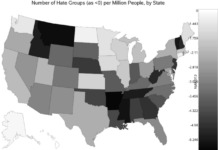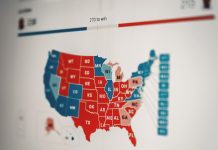Voter I.D. laws.
Voter suppression.
Regardless of the form it takes, Republicans are perpetrating a concerted campaign in America to disenfranchise Democrats and minorities who vote for them.
Now there is an amendment to a law that just passed the House of Representatives intended to further intimidate people at the polls–H.R.2825, the Department of Homeland Security Authorization Act of 2017.
The change to the 250-page bill sponsor Rep. Michael McCaul (R-Texas) and 11 other Republican co-sponsors have proposed consists of the following sentence in section 4012, titled “SECRET SERVICE PROTECTION AT POLLING PLACES:”
“This section shall not prevent any officer or agent of the United States Secret Service from providing armed protective services authorized under section 3056 or pursuant to a Presidential memorandum at any place where a general or special election is held.”
In other words, if signed into law, the President of the United States would have the authority to dispatch armed Secret Service agents to U.S. polling places for any reason.
The bill passed the House and was forwarded to the Senate on July 20 by a vote of 386 to 41 (32 Democrats, 9 Republicans) with less than an hour of scheduled debate. It was brought to public attention earlier this month through a letter from 19 states’ secretaries of state to Senate leaders Mitch McConnell (R-Ky.) and Chuck Schumer (D-NY) about “unprecedented and shocking language currently included in Section 4012 of HR 2825.”
The letter goes on to state:
“[The amendment] allows Secret Service personnel unlimited access to polling places pursuant to the President’s direction. This is an alarming proposal which raises the possibility that armed federal agents will be patrolling neighborhood precincts and vote centers.”
Secretaries argue:
“This longstanding and carefully crafted statute ensures the right of voters to cast their ballots under the limited authority of civil officers rather than law enforcement. Secretaries of State across the country agree that there is no discernable need for federal Secret Service agents to intrude, at the discretion of the president, who may also be a candidate in that election, into the thousands of citadels where democracy is enshrined.”
The 19 secretaries “humbly request” the senators remove language guaranteeing the president’s unfettered authority from the legislation.
One of the letter’s signatories, Massachusetts secretary of state, William F. Galvin, decried in the Boston Globe:
“This is worthy of a Third World country…I’m not going to tolerate people showing up to our polling places. I would not want to have federal agents showing up in largely Hispanic areas. The potential for mischief here is enormous.”
Secret Service spokesperson Catherine Milhoan asserts the agency only seeks “clarifying language” to allow agents to perform their duties. She did not explain the sweeping authority the language grants the president.
Two days later, the Secret Service issued an unsigned press release that presents the following:
“The intent of the U.S. Secret Service is grossly mischaracterized in a recent Boston Globe article. Our mission is apolitical as is the carrying out of our duties. The intent of a provision in a Homeland Security reauthorization bill is to simply allow us to protect those we are mandated to do so under Title 18 USC 3056 when at the election polls, and not violate the law.”
The Globe article does not accuse the Secret Service of trying to “violate the law.”
The Secret Service then presented the following anecdote of a November 2016 incident that belies its defense to the Globe:
“In November of 2016 leading up to Election Day, while attempting to conduct a protective assignment at a polling location, Secret Service personnel encountered some reluctance to our presence and the carrying of weapons.”
If it was truly “leading up to Election Day,” it means Secret Service agents were at a polling place without any specific individual to protect; i.e., unnecessarily.
ACLU lawyer Kristen Clarke compares placing Secret Service agents at polls to “tactics that we saw during the Jim Crow era.”
Then-Fla. governor Jeb Bush used similar tactics to suppress votes in the 2000 election that ultimately handed his brother the White House.
Image credit: npr.org





